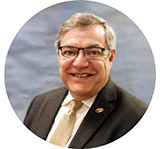We live in a fallen world, one given to sin and destruction. Consequently, sooner or later, we all experience trials and tribulations, troubles and problems, difficulties, illness and disease, or loss.
Our emotional reactions to such trials are many: concern, nervousness, confusion, stress and distress, bitterness, apprehension, dread, horror, discouragement, pain, heartache, despair, anguish, fear, desperation, loss of hope.
And, then of course, there is anxiety, which someone defined as worry that’s below the surface; and worry, someone defined as trying to solve problems without God.
We can experience anxiety on what might be considered two levels:
- Social or societal developments – the “macro level” negative developments we hear about every day on news channels.
I remember people, Christians among them, in the early days of COVID in 2020, who were clearly struggling with anxiety and maybe fear about this threatening and deadly virus.
For our friends in the Middle East and North Africa, and really, many places around the world, there is conflict and war, rampant inflation and grinding poverty, oppressive governments that deny citizens freedom of religion and speech, persecutions, and much more.
- Personal or emotional developments – the “micro level” negative circumstances that occur in our own, our loved ones, or our friends’ lives.
Anxiety about trials on either level can be overwhelming. Such trials, especially personal ones, like sudden illness or learning about a disease or losing a loved one, can swamp what we thought was our ability to handle anything that comes our way.
It is at this point, when we’ve hit the wall, are at the end of our rope, or have reached rock bottom that we realize we cannot handle, cannot deal with, maybe cannot even respond to the adversities and afflictions enveloping us.
We don’t know what to do and, in this moment, it’s possible to yield to crushing anxiety leading to debilitating depression and utter hopelessness.
Millions of Americans turn to opioids or some other form of medical treatment. America is now the most medicated country in the world, apparently possessing an insatiable appetite for opioid medications, legal prescriptions, or illegal synthetics off the street.
Sadly, though, these addictive, expensive, dangerous solutions are no solutions at all. They may deaden emotional pain and anxiety for a time, but they do not provide a long-term source of healing and peace.
But there is another possible response to the anxiety brought on by trials and tribulations in this world. We can do as the Lord instructed us in His Word.
“Do not be anxious about anything, but in every situation, by prayer and petition, with thanksgiving, present your requests to God. And the peace of God, which transcends all understanding, will guard your hearts and your minds in Christ Jesus” (Phil. 4:6-7).
We’re instructed not to be anxious, which of course is difficult to do in many circumstances. Yet the Lord says in every situation. And if we do this with thanksgiving, the Lord will grant us peace that passes understanding. This is a phenomenal and powerful promise.
This is my 91-year-old mother’s favorite passage of Scripture. During my days in high school when she faced a serious surgery, I remember her quoting these verses. Just a few years ago, I remember her quoting these verses when the Lord called Dad home to heaven. They had been married 66 years, only apart 3 days during that time, and enjoyed a wonderful marriage. Mom grieved, but she knows where Dad is, for which she is thankful, and she trusted God to help her live alone. I’ve witnessed how God gave her a peace that surpasses understanding.
In the Psalms, the shepherd king David loudly and poetically lamented his trials, troubles, and fears. He told God about everything he confronted and felt, and as a poet, he did so with creative imagery and memorable phrasing.
David talked about feeling agony in his bones, crying in his bed, experiencing distress, having a faint heart, feeling like he was drowning in his troubles and sorrows.
But David did not stay in his feelings and fears. He did not, like modern psychology says to do, “look inside himself” or “trust himself” to make changes. David knew he could not handle the trials and tribulations that overwhelmed him.
David did not stay wallowing in himself but looked outside himself to the Sovereign God. Time and again, when David’s anxiety was supreme and his fears threatened, he turned to the Lord.
David said, “We wait in hope for the Lord; He is our help and our shield. In Him our hearts rejoice, for we trust in His holy name. May Your unfailing love be with us, Lord, even as we put our hope in You” (Psalm 33:20-22).
David looked to the Lord for refuge, for deliverance, for peace.
He remembered and celebrated God’s character – who God is,
His mighty works – what God has done,
and His promises – what God says He will do for us.
Each time David faced trials, he returned to the Lord and in the Lord, he found security and solace. David said, “My flesh and my heart may fail, but God is the strength of my heart and my portion forever” (Ps. 73:26).
In the Christmas song, “O Little Town of Bethlehem,” the lyrics reminds us:
“The hopes and fears of all the years are met in thee tonight.”
“And peace to men on earth.”
Jesus’ advent in the manger, and His later life and finished work on the cross and in the resurrection, sealed God’s promise to those who believe. Our hopes and fears are met in Him, and He provides peace.

Dr. Rex Rogers
President, SAT-7 USA
Listen to Rex’s podcast episode on this topic here.